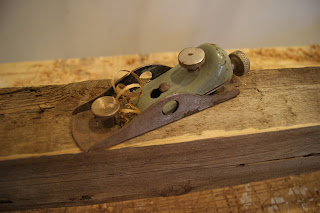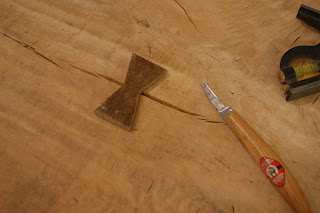A few exterior finishing touches remain, and I'll get to them (I promise!) but having just finished the interior drywall and gotten a couple of coats of paint up, it feels finished enough to post about.
Every shop needs a banjo, right? Mine does. And a painting of a John Deere 2010, which I spent many many hours on as a youngster cruising around the farm? Why not.
Ok, I'm not entirely spartan in my outlook: I've been hoarding these 24" wide cottonwood slabs, pausing every now and then to stroke them and say, "my precious" in the creepiest tone possible. They're the last that remain from a log I had sawn up about 4 years ago. The two on the right will be used soon for a dining table top, and the one of the left will be paired with a reclaimed barn wood base to create a hall table. You can just glimpse the edge of a bathroom vanity shaping up in the bottom right of the picture.
I've been eyeballing one of the cottonwood slabs (this chunk will be a "scrap" actually, and thus fair game for other things) because I can't help but imagine a fiddle back right there. It is long enough and wide enough for a one-piece back, which made me immediately wonder if I had enough for two. Sadly, though, the plank only measures about 1 3/8", so not even the most judicious resawing could provide me with two plates that are thick enough. Oh well, it'll still be a beaut!
But before that fiddle gets much attention, this below is next up. I figure it'll be a nice winter project. My friend Chris Jacoby called this grain "fierce" and I couldn't agree more. I am super psyched to get moving on it, although its hardly first on the list of things to do.
The source of this wood is super special: when I lived in Ithaca, New York, almost 20 years back, I bought lots and lots of wood from tiny local sawmill operations. I usually paid around $1 per foot, which is a screaming deal). Anyway, most of the lumber was sold "rough", which is to say unplaned and often in quite gnarly condition. I remember the day I bought this board: I got a pickup truck full of maple, some of it pretty twisty and janky, and most of it covered in dried mud, but I only paid about 75 cents per foot, so it still represented a pretty good haul. Shortly thereafter, my wife and I built a lovely walnut bedframe for ourselves, and we needed a bunch of slats to span between the sides to hold the mattress up. So I grabbed the cheapest, most expendable stuff I had kicking around, and cut a bunch of boards to the proper width. After sleeping on that bed for 15 years or so, we decided to get a larger bed. Well, it was actually her idea, and I railed against it for years, but she turned out to have been right. (Side note: It has taken me a long time, but I have now embraced the fact, cliched as it may sound, that my wife is pretty much always right). Anyway, when I finally took a closer look at those slats that I had been sleeping on for the better part of two decades, I saw there was gold in them thar hills. Or, in this case, flame in this here maple. Great story, right?
Back to my minimalist tendencies... This is most of my tools, right here! Not pictured is my 10" Jet tablesaw, but honestly, I barely use it anymore now that I've discovered the joys of track saws. I even sold my Powermatic jointer, which is heresy to most woodworkers, but that's how much I like the tracksaw.
Oh, and that reclaimed barnwood table base? Yup, here it is. And the hand plane I'm using has a great story too: I found it inside my buddy Paul's wall while we were opening it up to install some cabinets. It is just an old hardware store block plane from the 50's, but boy does it have some hustle to it. It is my go-to for everyday use.

Ye olde no-name block plane. So modest, but so sweet.
Here's that hall table shaping up. Still very much a work in progress. I'll be inlaying a few wooden "butterfly" keys on the top in a couple of key locations.
Butterfly keys are a classic way of working with cracks in large wood slabs. They serve as a way of stabilizing the crack and preventing it from opening up further. They're also a lovely way of embracing the imperfections in the world. It corresponds nicely to a Japanese worldview called wabi-sabi, which seeks to accept or transcend the impermanent and imperfect and find beauty in things as they are. Can't argue with that.










No comments:
Post a Comment